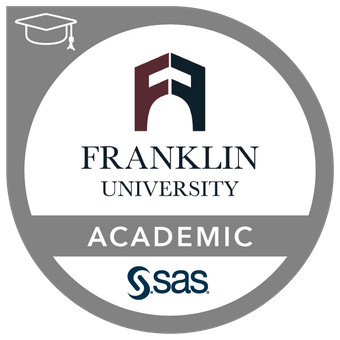Earn your analytics master’s degree online
Request Information
Your privacy is important to us. Privacy Policy
We're Sorry
There was an unexpected error with the form (your web browser was unable to retrieve some required data from our servers). This kind of error may occur if you have temporarily lost your internet connection. If you're able to verify that your internet connection is stable and the error persists, the Franklin University Help Desk is available to assist you at helpdesk@franklin.edu, 614.947.6682 (local), or 1.866.435.7006 (toll free).
Just a moment while we process your submission.
Translate data into actionable solutions that drive results
Choose from Franklin University’s master’s programs in Business Analytics, Data Analytics or Health Informatics and earn a degree that fits your talent and your ambition. No matter which option you pursue, you’ll complement your master’s degree with a SAS Joint Certificate in Data Analytics. This credential, built into the curriculum will underscore your analytics knowledge and abilities.
Use industry-leading tools to build your skills in statistics, programming, data management, data visualization, data mining, machine learning and advanced analytics.
Channel your talent for data analysis into a role in which you can inform decision making, improve efficiencies and ultimately improve patient care and outcomes. You’ll develop your competency in key areas including data analytics, math and computer science.
You’ll finish faster at Franklin with our accelerated 100% online programs. You’ll also benefit from our hassle-free admission process that lets you get started right away with a GPA of 2.75 or better.
Find the Data & Analytics Program That’s Right For You
If you’re interested in a master’s level data & analytics program, Franklin has a number of great options. The best fit for you depends on your interests and goals. Compare programs and identify your perfect match.
Focus:
Use data to help organizations solve business challenges, make decisions or inform strategy. Professionals working in business analytics positions use, manipulate and apply models that have been created by data analytics professionals.
Skills:
Polished communication skills are a must to effectively present your findings to leadership.
Careers:
Use your M.S. in Business Analytics to qualify for positions in marketing or sales analytics, HR analytics, operational/risk analytics or financial analytics.
Focus:
Draw on your statistical, database and computer programming skills to design and build data models that business analytics and health informatics professionals can manipulate and apply for decision making. Data analytics professionals focus on data science - coding, modeling and analytic tools - to collect and analyze data.
Skills:
Proficiency in statistics, programming experience, and an affinity for data modeling are necessary to provide meaningful, credible data to stakeholders.
Careers:
Put your M.S. in Data Analytics to work as a data engineer, data analyst or data scientist.
Focus:
Illustrate the financial impact of an extended hospital stay by manipulating and applying data models built by data analytics professionals. Health informatics professionals rely on data models to improve healthcare processes, lower costs and improve patient outcomes.
Skills:
Bring your curiosity about how the details contribute to the big picture and you’ll play a valuable role in cross-functional teams whether you’re working toward short-term improvements or long-term goals in healthcare operations.
Careers:
Leverage your M.S. in Health Informatics to attain advanced practice roles like healthcare data analyst, clinical informatics manager or EHR implementation director.
Tier 2 SAS Academic Specialization in Data Analytics

Earn a badge that designates you as a skilled analytics professional
As part of your Franklin master’s degree, you’ll also earn a SAS Tier 2 Academic Specialization in Data Analytics. According to EMSI labor market analytics, nearly 220,000 job postings listed SAS as a desired skill in 2019. This digital badge, issued jointly by SAS and Franklin University, recognizes your ability to leverage SAS analytic tools for data preparation, advanced analytics and visualization. The badge is awarded after your successful completion of three master’s-level courses: MATH 601 (Introduction to Analytics), DATA 605 (Data Visualization and Reporting) and DATA 610 (Big Data Analytics). The knowledge gained through these courses provides you with valuable insight that is sought by SAS customers at more than 65,000 sites in more than 135 countries, including 90 of the top 100 Fortune 500 companies.
- Degrees
- Microcredentials & Certificates
- Admissions
- Tuition & Financial Aid
- Transferring Credit
- The Franklin Experience
- About Us
- FranklinWORKS Marketplace
- Safety & Security
- Policy Information
- Your Privacy Settings
- Privacy Policy
- Terms of Use
- Careers At Franklin
- Sitemap
Franklin University
201 S Grant Ave.
Columbus, OH 43215
Local: (614) 797-4700
Toll Free: (877) 341-6300
admissions@franklin.edu
Copyright 2025 Franklin University
Franklin University is accredited by the Higher Learning Commission (hlcommission.org/800.621.7440) and authorized by the Ohio Department of Higher Education.
Franklin University is committed to being an inclusive community free from all forms of discrimination and harassment.
Your privacy is important to us. Privacy Policy